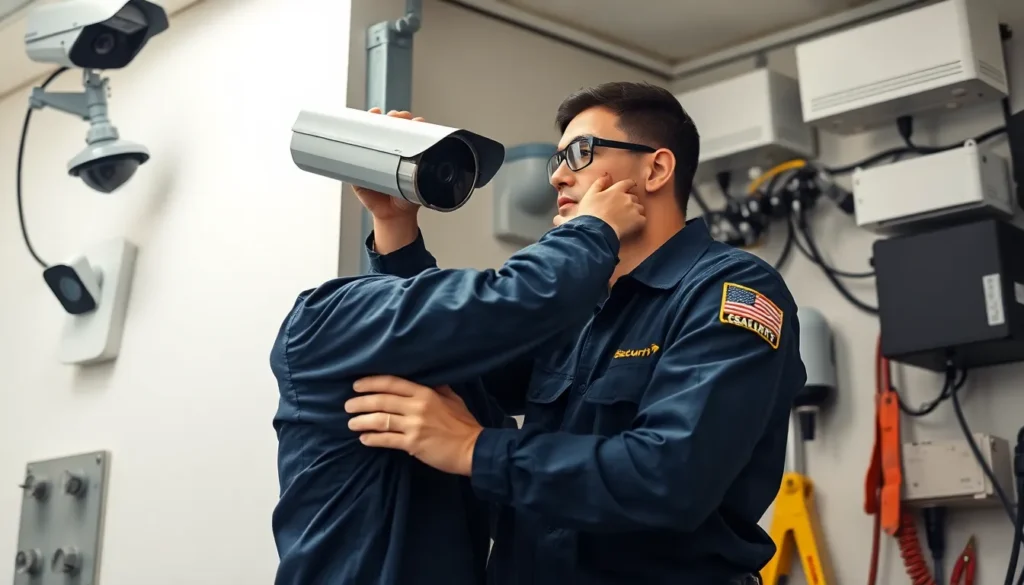Table of Contents
ToggleIn a world where security breaches are as common as bad coffee, becoming a security technician is like donning a superhero cape—minus the spandex, of course. These tech-savvy heroes are the unsung guardians of our digital and physical realms, ensuring that our data and assets stay safe from the clutches of cyber villains and real-world troublemakers. But how does one go from couch potato to security savior?
Overview of Security Technician Training
Security technician training equips individuals with crucial skills to protect digital and physical environments. Many programs emphasize a hands-on approach, combining theoretical knowledge with practical experience. Certification courses often cover cybersecurity fundamentals, networking principles, and risk management strategies.
Students encounter various topics during their training. These include installation, configuration, and maintenance of security systems. They learn about intrusion detection, firewalls, and surveillance technologies. Every training program aims to prepare individuals for real-world challenges they may face on the job.
Skills in critical thinking and problem-solving are essential. Training often incorporates scenarios that simulate potential security breaches, fostering quick decision-making. Communication skills also receive attention, as technicians must relay complex information to both technical teams and clients.
Certification organizations, such as CompTIA and Cisco, provide recognized credentials in the field. These certifications demonstrate a technician’s competency and knowledge, improving employment prospects. Job placement services may assist graduates in finding positions in various sectors, including government, finance, and healthcare.
Hands-on labs and workshops play a significant role in skill development. Real-world simulations help trainees apply their knowledge in controlled settings. Networking opportunities with industry professionals often arise through these programs, giving trainees valuable insights and connections.
Security technician training emphasizes both technical and soft skills necessary for success in an evolving landscape. Each step in this training process supports the transformation into a capable security professional prepared to tackle emerging threats.
Key Skills Required

Security technicians need a blend of technical and soft skills to excel in their roles. These skills ensure they can effectively protect both digital and physical assets in various sectors.
Technical Skills
Technical skills form the backbone of a security technician’s expertise. Familiarity with cybersecurity fundamentals is essential for understanding threats and defenses. Knowledge of networking principles enables technicians to configure and manage systems properly. Hands-on experience with security tools, such as intrusion detection systems and firewalls, proves invaluable. Proficiency in analyzing security incidents helps technicians respond effectively to breaches. Familiarity with surveillance technologies also enhances their ability to secure environments.
Soft Skills
Soft skills play a vital role in enhancing a security technician’s effectiveness. Communication skills enable technicians to convey complex information clearly to both technical teams and clients. Problem-solving abilities allow them to assess situations quickly and implement effective solutions during emergencies. Adaptability is crucial, as the security landscape evolves rapidly. Strong teamwork fosters collaboration with other professionals for comprehensive security measures. Critical thinking supports informed decision-making in high-pressure scenarios.
Training Programs Available
Various training programs equip aspiring security technicians with essential skills. Options include online courses and in-person workshops, both offering unique advantages.
Online Courses
Flexibility defines online courses, allowing students to study at their own pace. These programs often cover core topics, such as cybersecurity, networking fundamentals, and risk management strategies. Students access a wide array of resources, including video lectures and interactive quizzes, enhancing the learning experience. Recognized institutions frequently offer certifications upon completion, boosting credentials in a competitive job market. Networking opportunities during these courses connect learners with industry professionals and potential employers, aiding career advancement.
In-Person Workshops
In-person workshops foster hands-on experience, helping participants gain practical skills. Attendees engage in real-world simulations, tackling scenarios that reflect actual security threats. Participants learn to install and configure security systems, such as surveillance technologies and firewalls. Networking opportunities abound in these settings, as students interact directly with instructors and peers. Many workshops feature guest speakers from the industry, providing insights into the latest trends and technologies. By emphasizing teamwork and communication, workshops prepare trainees for collaborative environments in their future careers.
Certification Options
Certification plays a crucial role in the career of a security technician. A variety of options exist for professionals looking to enhance their credentials.
Industry Recognized Certifications
Many respected organizations offer certifications that signal a technician’s expertise. CompTIA Security+, Certified Information Systems Security Professional (CISSP), and Cisco Certified Network Associate (CCNA) serve as notable examples. Each certification focuses on important security principles, networking technologies, or risk management strategies. Earning these credentials often leads to improved job prospects and demonstrates a commitment to professional growth.
Benefits of Certification
Certification provides multiple advantages for security technicians. Obtaining recognized credentials enhances credibility and increases the likelihood of securing employment. Employers frequently seek out candidates with certifications as proof of knowledge and practical skills. Networking opportunities arise through certification programs, allowing professionals to connect with industry peers. Furthermore, ongoing education related to certification keeps technicians up to date with the latest trends and technologies, reinforcing their value in a rapidly evolving industry.
Career Opportunities
Security technicians face diverse career opportunities in a rapidly evolving field. They can specialize in areas like cybersecurity, physical security, or surveillance systems.
Job Roles
Roles for security technicians vary widely across industries. They may work as cybersecurity analysts, focusing on protecting networks from cyber threats. Positions also exist as security consultants, where they assess systems and recommend improvements. Technicians might serve as systems administrators, managing security tools and ensuring system integrity. Another common role involves being a security system installer, where hands-on skills come into play. With the growing need for security professionals, technicians often find themselves in demand in government, finance, and healthcare sectors.
Salary Expectations
Salary expectations for security technicians depend on experience and location. According to PayScale, the average annual salary for security technicians hovers around $60,000. Entry-level positions typically start at about $40,000. Highly skilled technicians, especially those with certifications like CISSP, can earn upwards of $90,000 annually. Geographic areas with high demand, such as major metropolitan cities, may offer even higher salaries. Additionally, specialized roles often come with significant salary increases, reflecting the high value placed on expertise in this field.
Security technician training is a vital stepping stone for those looking to enter a dynamic and rewarding field. With the increasing demand for skilled professionals to combat evolving threats, this training equips individuals with both technical and soft skills essential for success.
Hands-on experience and recognized certifications not only enhance employability but also prepare technicians to tackle real-world challenges. As the landscape of security continues to change, those who invest in comprehensive training will find themselves well-positioned for diverse career opportunities. Embracing this journey transforms aspiring technicians into indispensable protectors of our digital and physical environments.




